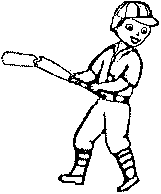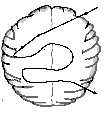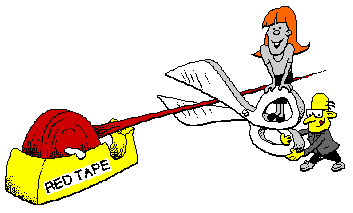What is a Learning disability? (from chapter 1 of the self-advocacy manual)
Definition: A 'learning disability' is a disorder in one or more of the basic psychological processes involved in understanding and using language spoken or written which may manifest itself in an imperfect ability to listen, think, speak, read, spell, or do mathematical calculations.
Wow, is that ever confusing?!!! What does it mean?

Well, that's the legal definition. There are really 2 parts to a learning disability.
and
Discrepancy
First, having a learning disability means that your brain 'processes' information differently than most other students. Certain kinds of information get stuck or lost while traveling through your brain.
Second, having a learning disability causes a 'discrepancy' between your ability and your achievement. This means that you are a lot smarter than you perform in school. You might be just as smart as someone sitting next to you in class, but your grades in certain areas aren't as good. This isn't because you are dumb, lazy, or anything else bad. You just learn differently.
It's kind of like a baseball player who has the 'ability' to hit home runs but is given a broken bat to use. He doesn't have the chance to prove how great he really is.

An LD student often has trouble proving how smart he or she is.
Explain more about information processing.
Information processing refers to how your brain:
Takes in information,
Uses this information,
Stores the information in memory,
Retrieves the information from memory, and
Expresses the information
Learning disabled students struggle with certain kinds of learning because their brains have difficulty 'processing' certain kinds of information. It is like when you go on a car trip and get stuck in road construction. It takes you a lot longer to get where you are going. Its the same with information going through your brain.

Information gets 'bogged down' in certain areas of an LD brain. When information gets bogged down, it is much more difficult to learn.Different kinds of information travel through different parts of the brain. That's why some information is learned quickly and easily while other information is much more difficult.

What learning areas are affected?
A learning disability can affect:
Basic Reading
Reading Comprehension
Math Calculation
Math Reasoning
Written Expression
Oral Expression
Listening Comprehension
Why do LD students get 'Special Education' help?
Each State has rules about who can receive special education services. Because these services are very expensive you have to 'qualify' according to the rules of the State.

For special education services you have to prove that your learning difficulty is caused by the way your brain processes information. You also have to prove that your processing difficulty causes a 'severe discrepancy' between what you should be able to learn (how smart you are) and how much you have learned (your achievement). You are given special tests to find out if you qualify for special education services.
NOTE: It is possible for a student to 'technically' have a disability but not to 'qualify' for special education services. This happens when a student demonstrates the information processing difficulties associated with a LD but his or her academic skills are not found to be 'severely discrepant' from their ability. This may indicate that the student has learned how to 'cope' with his/her learning difficulties at least to some extent.
Are all students with learning disabilities alike?
No. But many students with learning disabilities experience very similar processing and learning difficulties. And all LD students get frustrated in school.

Do LD students ever 'get over' their learning disabilities?
A true learning disability never goes away. But, with understanding and effort you can learn to use your many strengths to 'compensate' for your weaker processing skills. You may also be able to strengthen your weak processing skills so that your learning difficulties are not so severe. Many people with learning disabilities are highly creative and 'gifted' in many ways. Even many famous and very successful people have learning disabilities.
Is a learning disability the same as Dyslexia?
Dyslexia is simply a fancy word for a disability that involves reading. Other similar terms include Dysgraphia (writing disability) and Dyscalculia (math disability).
Return to the LDinfo Web Site to find out about any of the following topics (and more):
Learning disabilities - what is a learning disability (LD or SLD)?
Dyslexia: Dyslexia is a reading disability or reading disorder
Dysgraphia Dysgraphia is a writing disability or disorder
Dyscalculia Dyscalculia is a math disability or disorder
What is an attention deficit disorder (ADD, AD/HD, ADHD)?
Gifted LD: Can a student be gifted and LD?
Emotional/Behavioral issues and LD: Do LD students experience behavior problems or depression?
Section 504: What is a Section 504 plan?
What is special education?
What is processing?
What is a severe discrepancy?
What is a nonverbal learning disability (nonverbal LD or NLD)?
What is a central auditory processing disorder (CAPD)?
-
LD or SLD - What is a Learning Disability?
- NEW - Executive Functioning - What does this have to do with LD?
-
NEW - Response to Intervention (RTI) Is this a new way to identify LD?
-
Dyslexia - I know this has something to do with reading, but what really is it?
-
Dysgraphia - Is this anything like dyslexia?
-
Dyscalculia (or dyscalcula) - This must have something to do with math.
-
ADD or ADHD - What is an attention deficit disorder?
-
Gifted-LD - How can you be gifted and LD?
-
Nonverbal Learning Disability (NLD) - Is this a new term?
-
Central Auditory Processing Disorder (CAPD) - Is this a new term?
-
Severe Discrepancy - What is a discrepancy and how severe is 'severe'?
-
Processing - What is processing?
Copyright © 2006-2017 LDinfo Publishing
All rights reserved. Any reuse or republishing of the text
or images on this web site without prior written consent of
the copyright holder is prohibited.